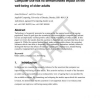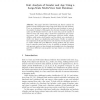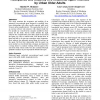180 search results - page 2 / 36 » Age Differences in Adults' Use of Referring Expressions |
IJMMS
2006
13 years 5 months ago
2006
Technology is frequently presented as a panacea for the support needs of the ageing population, based in part upon the commonly-cited assertion that computer and internet use has ...
ACCV
2010
Springer
13 years 9 days ago
2010
Springer
This paper describes video-based gait feature analysis for gender and age classification using a large-scale multi-view gait database. First, we constructed a large-scale multi-vie...
CHI
2005
ACM
14 years 5 months ago
2005
ACM
This study examines the acceptance and usability of an animated conversational agent designed to establish longterm relationships with older, mostly minority adult users living in...
FGR
1998
IEEE
13 years 9 months ago
1998
IEEE
Current approaches to automated analysis have focused on a small set of prototypic expressions (e.g., joy or anger). Prototypic expressions occur infrequently in everyday life, ho...
JOCN
2011
13 years 6 days ago
2011
■ Emerging evidence indicates that stimulus novelty is affectively potent and reliably engages the amygdala and other portions of the affective workspace in the brain. Using fun...



